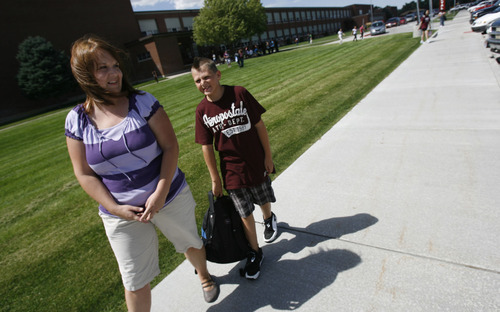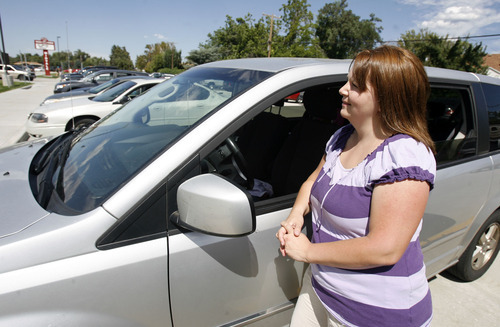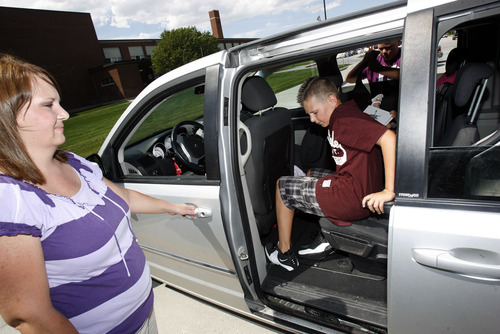This is an archived article that was published on sltrib.com in 2011, and information in the article may be outdated. It is provided only for personal research purposes and may not be reprinted.
Midvale • Zachary Vinson was nervous about moving from elementary to middle school this week. Would he be able to find all of his classes? Could he open his locker? With his locker open, could someone shove him inside?
But a trial-run, mock first day of school at Midvale Middle for seventh-graders on Friday helped ease his worries and prepared him for the real deal Monday. What did he look forward to most?
"Not being in elementary," said 12-year-old Vinson. "I just felt like a little kid half the time."
The bad news, he noted, is that he does fit inside his locker. He checked.
First-day jitters at middle and junior high schools are common for students and parents alike. It can be a daunting transition as parents watch their kids become more independent and kids grapple with new academic and social challenges.
"Lots of changes are happening simultaneously," said Ellie Young, a school psychology professor at Brigham Young University. "[For students], their academic life changes from having one teacher to having several teachers each day with varying expectations in each class. Instead of being in a small elementary school, they now have an opportunity to associate with lots of different types of kids beyond their neighborhood. In addition, their physical bodies are changing with growth spurts and all kinds of developments."
It can be difficult to manage, she said. But parents can help. "Parents shouldn't underestimate their ability to guide and support their early adolescent child."
She suggests parents maintain an open, trusting relationship with their kids. Parents need to be "cheerleaders" but they also need to let their kids make mistakes.
"Learning how to pick yourself up again is a valuable skill," she said. "If they need help fixing [a mistake], maybe stand behind them and help them figure out how to fix it."
Adolescence also is an "exciting" time, she added, when children and parents often develop common interests and share in fun activities.
Isaac Montoya, the father of three boys, has noticed that dinner-table conversations have become more engaging as his sons have matured and taken an interest in topics ranging from education to religion. On Friday, he attended a parent orientation at Midvale Middle as his youngest son, a seventh-grader, went to short versions of each of his classes.
"I've seen them actually wanting to know and asking more questions as they get older," he said. "That's where parenting comes in. If you have a strong nest at home in these years, it just makes it a little easier to kind of sit down and talk."
One area of concern for Montoya is social networking. How should parents manage their children's use of websites like Facebook?
"I want my kids to be part of the growth in technology. I don't want to seclude them in anyway," he said. "But it is alarming to see kids just be let loose in that world."
Montoya is friends with his sons on Facebook and observes their interactions but doesn't "meddle" in their online conversations. He has spoken with them about understanding that what they say to one friend can be viewed by others and that things they post online may never go away.
It's a good idea for parents to set guidelines about how to use the Internet, camera phones, text messages and emails, Young said. If parents plan to review texts, emails or personal messages on Facebook, they should let their kids know up-front.
"It's a difficult role for parents to play in some regards, because it feels like it's lurking," she said. "I think it's fair in today's world. Other people see that as overly intrusive or not allowing your children to have privacy."
Bob Spears, a counselor at Midvale Middle, recommends parents keep tabs on their students' academic progress by using a school's online system. He suggests checking grades online weekly. If an A student suddenly begins getting D's, that's a red flag. The student may be in the wrong class, may need to ask for help or may be dealing with a social problem such as bullying.
It can be helpful to spend time with kids one-on-one without siblings, he noted. He recommends regular lunch dates and also sitting down to review scores students earned on tests and assignments.
John Hellwig, assistant principal of Midvale Middle, hopes students who are struggling will seek out a counselor or an administrator like himself.
"It's those students who don't ask for help who are the ones who really worry us," he said. "We really see that the patterns set in middle school will determine their success in high school and beyond. If they have habits of attending class on time and asking for extra help when they don't understand their homework, they will continue to do that in high school and college."
Sharon Vinson, Zachary's mom, hung back as her son attended his seventh-grade orientation. He checked in before he started making the rounds of his classes, and she encouraged him to go by himself.
"It's hard to kind of let them go and have to be on their own, knowing that mom's not going to be there volunteering in the classroom," she said. "I'm telling him, 'Go explore, you've got to figure it out.' "









